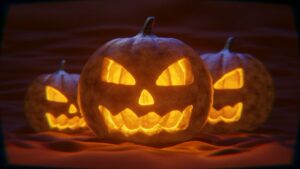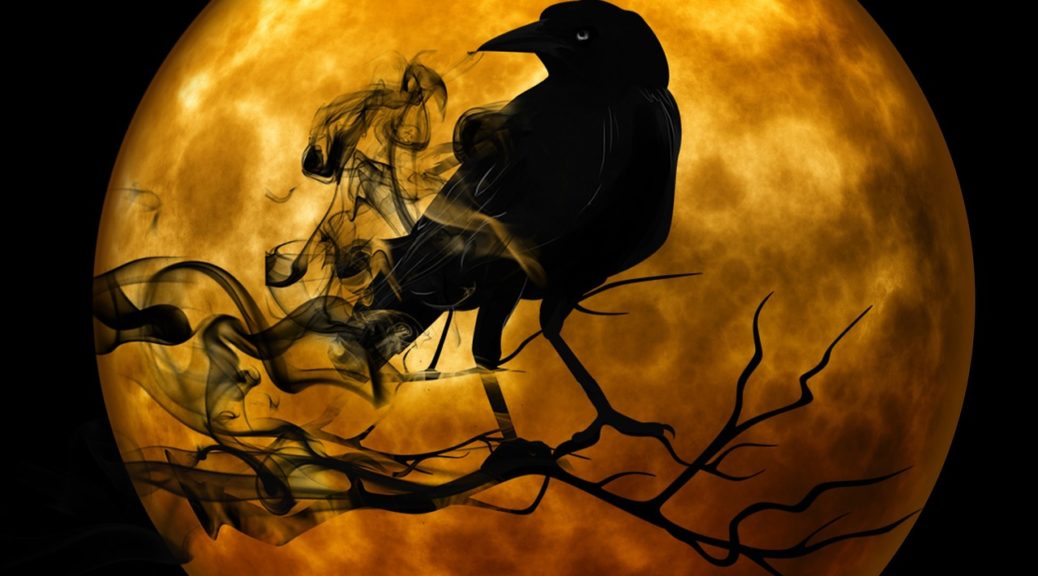 |
| Thanks to Magickal Graphics |
My husband asked me if Halloween was a special time for Heathens. I looked at him blankly, but then I realized that being pagan may make it appear that we celebrate other pagans’ holidays. I grinned and reassured him I’m not that kind of pagan. I then pointed out our version of Samhain — if we have a “version,” happens around the winter solstice. So, like everything in my life, I started researching Samhain.
What Samhain is for the Uninitiated
 |
| Thanks to Magickal Graphics |
Samhain (pronounced “sah-win” for those who don’t speak Celtic) is the Celtic New Year when the Celts believed that the veil between the worlds of the living and dead was thinnest. I found that interesting because Heathens tend to think of that time as Winter Solstice. As an aside, I really do think our Yule is more correct with Mother’s Night, but Samhain a Wiccan holiday, so it’s theirs to argue about, not mine. It’s also the end of harvest for them, which is probably why they equate it with the end of the year and the beginning of the new year.
Samhain has the characteristic ancestor veneration that we do. It arrives on the sunset of October 31st and ends on the sunset of November 1st. It’s celebrated with bonfires (purportedly to keep the sun burning through winter), disguises (so evil spirits don’t recognize the people), and sacrifices and gifts made for the dead. There is a ritual of leaving doors open so that the spirits of kind ancestors can come into the home and visit.
Where Halloween Comes From
 |
| Courtesy of Magickal Graphics |
Not surprisingly, the Catholic Church snagged November 1st and made it All Saints Day. All Souls Day is November 2nd. If I recall my Catholic upbringing, I seem to remember it was a Holy Day of Obligation (Translation: Get your ass to church and fill the coffers.) which was intended to make the revelry around Halloween less popular. When they couldn’t do that, they came up with All Souls Day on November 2nd. Interestingly enough, people simply moved their pagan celebrations over to November 2nd since it was now Church sanctioned. People dressed up as angels, devils, and saints, and there were parades and bonfires. One tradition started in England which was most likely a precursor to trick or treating was that poor people would go door to door and beg for “soul cakes” in exchange for praying for the household’s dead.
Halloween gets it’s name from All Saints Day. In England, All Saints Day was known as All Hallowmas from the Middle English word, Alholowmesse, which means All Saints Day. Naturally, the day before was All Hallows Eve, which soon became our word for Halloween.
Halloween and America
 |
| Courtesy of Magickal Graphics |
Halloween traditions came over with the Irish in the early to mid 19th century. Going door to door asking for food and money, a Halloween tradition, was soon replaced with trick or treating. Parties soon became more the norm. To avoid frightening children too much, newspapers encouraged parents to tame the scary stuff. So, Halloween became a secular holiday by20th century.
Halloween was a community celebration, but was being plagued by vandalism. By the 1950s, politicians and community leaders directed Halloween festivities toward trick or treating and made it into a children’s holiday.
Nowadays, Halloween is for both kids and adults. Trick or Treating is still for the kids, but both kids and adults have fun dressing up and partying.
So, What Does This Have to Do with Heathenism?
So now that I’ve talked about Halloween and Samhain, it’s time for me to talk about how Samhain isn’t really a Heathen holiday. Unless you’re Irish or venerate the Irish pantheon (I find the word “worship” a little too strong), I’d say Samhain doesn’t have any real religious significance for those who follow the Norse gods. I find the idea sweet — venerating the ancestors — but we do this already during Álfablót and Disablót. Depending on what you read, Álfablót could be celebrated on Halloween, but honestly, what we know about Álfablót tends to make it more of a private holiday with the family, rather than being a huge community party or trick and treating.
 |
| Courtesy of Magickal Graphics |
I’m Not a Fan of Halloween
I’ll be honest with you: I’ve never been a huge fan of Halloween because of the overtly commercialism. I sigh and shake my head when I pass by homes with Halloween lights and even inflatable ghosts and ghouls because, let’s face it, its commercialism rivals Christmas. Which isn’t a far off statement. It’s the second biggest holiday behind Christmas with Americans spending some $6 Billion USD each year on the holiday. That’s billion with a B. And one fourth of all candy sales over the year is Halloween candy.
Now, you might point to Christmas and say the same thing on how commercial it is. Yeah, but I celebrate Yule, which is vastly superior, in my book. Also, I like Christmas caroles, even though many are modern, relatively speaking. The fact that today’s Christmas is a 19th century contrivance doesn’t necessary bother me. But that is for another time.
Álfablót
Álfablót is usually celebrated at the last harvest. Which could be at the end of October. When I think about harvest, I generally think about it as being something in late September or even early October. The closest thing to Álfablót we might have in American culture might be Thanksgiving. I really don’t think of it as Samhain or Halloween, but maybe you do? I’d like your thoughts on it.
What to Do as a Heathen
Now, this doesn’t mean that you can’t celebrate Samhain as a holiday. It doesn’t mean you can’t celebrate Halloween as a holiday. We’re the party-hardy kind of religion to begin with, so I think it’s quite appropriate to celebrate either if you want to. I’m pretty certain that Northern pagans didn’t say “oh, I’m not celebrating that because it’s not traditional” when it came to holidays. Now, if you’re a recon, you may be thinking something different, but seeing as I’m not, I don’t have a problem with it.
 Welcome to Halloween 2021. If you’re new to this blog, you may not be aware that I am not the Samhain/ Halloween kind of person. BUT, I understand that a number of you are, so with that in mind, check out my blogs on Halloween.
Welcome to Halloween 2021. If you’re new to this blog, you may not be aware that I am not the Samhain/ Halloween kind of person. BUT, I understand that a number of you are, so with that in mind, check out my blogs on Halloween.





